Middle East
Russia-Ukraine Black Sea deal: What is it, and will it work? | Russia-Ukraine war News
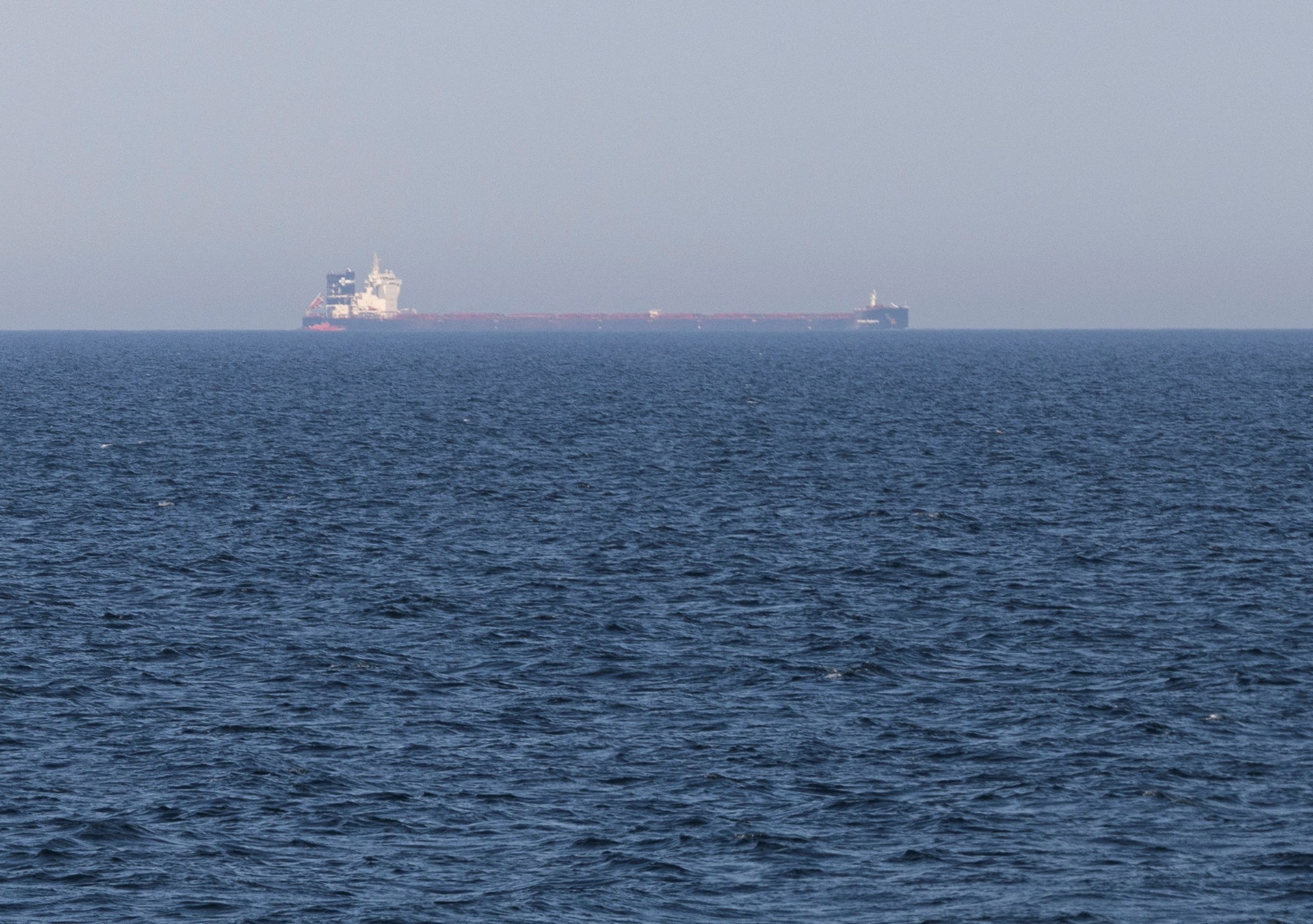
The United States has agreed to help Russia boost its agricultural and fertiliser exports to the world market in exchange for a maritime security deal in the Black Sea.
The White House, the Kremlin and Ukraine announced the deal on Tuesday after teams from the US and Russia met in Saudi Arabia to carve out a pathway towards peace in Ukraine.
These negotiations came amid the Trump administration’s push to end the war in Ukraine that has dragged on since 2022. President Donald Trump shifted US policy on Ukraine by proactively engaging with Moscow and accepting some of its biggest demands, including ruling out Ukraine’s NATO membership.
Here is what the latest deal is about:
What is the Black Sea deal about?
A statement released by the White House on Tuesday said Ukraine and Russia had agreed to stop the use of force and the military use of commercial vessels in the Black Sea.
The White House also issued an almost identical statement, suggesting that the US and Ukraine had agreed to these terms.
The Kremlin issued a statement, adding that the US and Russia would organise “appropriate control measures through inspection of such vessels”, without specifying what these measures would be.
In return, the US will “help restore Russia’s access to the world market for agricultural and fertilizer exports, lower maritime insurance costs, and enhance access to ports and payment systems for such transactions”, the White House statement said.
But the Kremlin statement was more specific in terms of Russia’s demands: it added that the pause on fighting in the Black Sea would come into force only after sanctions are lifted from the Russian agricultural bank, Rosselkhozbank, alongside other financial organisations which work with international food trade, including that of fish products and fertilisers. The Kremlin statement added that these organisations must be connected to the SWIFT system and any sanctions and restrictions on food, fertiliser, ships and agricultural machinery must be lifted.
SWIFT, which stands for Society for Worldwide Interbank Financial Telecommunication, is an international financial artery which allows for the better flow of funds transfers across borders. A month after Russia’s full-scale invasion of Ukraine in February 2022, seven Russian banks were removed from SWIFT. Rosselkhozbank was removed a few months later, in June 2022.
Since the beginning of the war, the US and its allies have placed at least 21,692 sanctions on Russian individuals, media organisations, or institutions in the military, energy sector, aviation, shipbuilding and telecommunications sectors.
The statements said the US and Russia “welcome the good offices of third countries with a view toward supporting the implementation of the energy and maritime agreements”. While the statements did not mention specific countries, Turkiye has previously mediated a Black Sea grain deal, and India has helped convince Russia to stick with it.
What else did the White House and Kremlin say?
Both the White House and Kremlin statements said Washington and Moscow would “develop measures” to implement an earlier agreement between Trump and Russian President Vladimir Putin over a phone call on March 18 to halt attacks on Russian and Ukrainian energy infrastructure.
This agreement was accepted by Ukrainian President Volodymyr Zelenskyy. But as in the past, details remain vague. The latest US and Russian statements do not specify the “measures” that would lead to a halt in attacks on energy infrastructure. Since this agreement, Russia and Ukraine have accused each other of attacking energy infrastructure.
The Kremlin statement added that there is a possibility of “extension and withdrawal from the [ban on energy strikes] agreement in the event of non-compliance by one of the parties”.
How did Zelenskyy respond?
In his nightly video address posted to his X account on Tuesday, Zelenskyy said, “Ukraine is ready to work as swiftly as possible and with absolute transparency to end the war.”
However, he expressed distrust in Moscow, saying: “There is something that the Kremlin is lying about again: that allegedly the silence in the Black Sea depends on the issue of sanctions, and that allegedly the start date for the silence in the energy sector is March 18.”
“If there is renewed military activity in the Black Sea, if Russian manipulations and threats continue, then new measures will need to be taken, specifically against Moscow,” Zelenskyy said.
Ukrainian Defence Minister Rustem Umerov said further discussions were needed to iron out the details of the Black Sea deal.
“The Ukrainian side emphasizes that all movement by Russia of its military vessels outside of Eastern part of the Black Sea will constitute violation of the spirit of this agreement, will be regarded as violation of the commitment to ensure safe navigation of the Black Sea and threat to the national security of Ukraine,” Umerov wrote in an X post on Tuesday. He added that in this scenario, Ukraine “will have full right to exercise right to self-defense”.
“For the effective implementation of the arrangements, it is important to hold additional technical consultations as soon as possible to agree on all the details and technical aspects of the implementation, monitoring and control of the arrangements,” Umerov wrote.
What were the talks on the Ukraine war in Saudi Arabia?
From March 23 to 25, a delegation from the US met separately with Russian and Ukrainian teams in Saudi Arabia’s capital Riyadh.
The Russian delegation was led by diplomat Grigory Karasin, who has previously been deputy foreign minister and ambassador to the United Kingdom. Alongside Karasin, the Russian team also included Sergei Beseda, a veteran of Russia’s Federal Security Service (FSB). The Ukrainian delegation was led by Ukrainian Defence Minister Rustem Umerov and Pavlo Palisa, a top military adviser to Zelenskyy.
The Reuters news agency reported that the US team included White House National Security Council’s senior director, Andrew Peek, and Director of Policy Planning Staff Michael Anton, according to a source briefed on planning for the talks in Riyadh.
How did we get here?
This deal is a resumption of the Black Sea Grain Initiative, struck in 2022 with the mediation of the United Nations and Turkiye.
The initiative entailed a three-year memorandum of agreement allowing the safe export of 33 million metric tonnes of Ukrainian grain across the Black Sea despite the war. In return, UN officials agreed to facilitate Russian food and fertiliser exports to foreign markets.
In 2023, Moscow pulled out of this deal, citing difficulties and hurdles in exporting its own food and fertilisers. While Russian food and fertiliser companies are not the target of Western sanctions, Moscow said restrictions on logistics, payments and insurance fees had hindered shipping.
In advance of the talks in Riyadh, US National Security Advisor Mike Waltz told CBS News on March 23 that the resumption of the grain deal would be the main focus of the talks. “We are now going to talk about a Black Sea maritime ceasefire so that both sides can move grain, fuel, and start conducting trade again in the Black Sea,” he said.
Could the deal help restore peace over the Black Sea?
John E Herbst, a senior director at the Washington, DC-based think tank Atlantic Council, called the deal a “useful step, but not a major one” in an analysis published on its website. This is because the Black Sea has not seen major military activity after Ukrainian naval drones chased the Russian Black Sea Fleet out of Crimea, he added.
On the other hand, Matthew Kroenig from the Atlantic Council wrote that the announcement was “a step toward circumscribing the conflict on the road to eventual peace”.
Daniel Fried, the Weiser Family distinguished fellow at the Atlantic Council, had a different view, however.
“The United States risks being sucked down a rabbit hole of concessions, easing pressure on Russia while Russian forces continue to attack Ukrainian cities and civilians,” Fried wrote on the Atlantic Council website. “Today’s deal is no peace through strength.”
What’s next?
Future talks between the US and Russia would see the involvement of the UN and other countries, Russian news agency TASS reported, citing Karasin.
“Everything was discussed – there was an intense, challenging dialogue, but it was very useful for us and for the Americans,” Karasin said.
“We will continue to do this, involving the international community, first of all, the United Nations and individual countries,” said Karasin, without specifying which individual countries he was talking about.
“In general, the impression was of a constructive dialogue, which is needed and necessary. The Americans are also interested in this.”
How is Europe viewing the Riyadh talks?
United Kingdom Prime Minister Keir Starmer and French President Emmanuel Macron are expected to hold talks on Thursday to discuss a “coalition of the willing” that the British leader had announced on March 2.
The idea is that a coalition of Ukraine’s willing European allies would devise terms for peace and present them to the US, and potentially play a prominent role in offering security guarantees to Ukraine under any peace agreement with Russia.
However, Europe has been kept out of the recent discussions in Saudi Arabia, and the coalition was not mentioned in the White House and Kremlin’s statements.
Trump’s Middle East envoy, Steve Witkoff, who has been involved in the Russia-Ukraine negotiations, described Starmer’s idea as “a combination of posture and pose” in an interview with conservative journalist Tucker Carlson, which streamed online on March 22.
Middle East
F1 Saudi GP: Piastri beats Verstappen, leads drivers’ championship | Motorsports News

Oscar Piastri’s victory put Australia on top of the Formula One world championship for the first time since 2010.
McLaren’s Oscar Piastri cruised to victory in the Formula One Saudi Arabian Grand Prix to move atop the driver’s championship after five races on the season.
The 24-year-old became the first driver this season to win while not starting on the pole, and he comfortably finished the race ahead of runner-up Max Verstappen of Red Bull, who was given a five-second penalty for leaving the track and gaining an advantage in the opening lap of the race on Sunday.
Charles Leclerc finished third to give Ferrari its first podium of the season. Piastri’s McLaren teammate Lando Norris finished fourth, while Mercedes’s George Russell finished fifth and Kimi Antonelli was sixth.
With his third victory of the season, and second consecutive after winning at Bahrain last week, Piastri becomes the first driver from Australia to lead the drivers’ championship standings since Mark Webber in 2010. It is the first time Piastri has led the drivers’ standings in his F1 career.
Piastri, who began the race from second position on the starting grid, ultimately took the lead on the 6.1km (3.8-mile) track after Verstappen served his five-second penalty during a pit stop on Lap 22. He finished off his fifth career victory in his 51st start without much of a challenge from Verstappen, crossing the finish line 2.84 seconds ahead of the reigning world champion.
In addition to 2025 race victories in Saudi Arabia and Bahrain, Piastri also won the second race of the season in China. McLaren has won four of the five races after Norris won the season-opening race in Australia.
Verstappen’s runner-up finish came after he won the Saudi Arabia Grand Prix in two of the last three years.
In the drivers’ championship, Piastri has 99 points to Norris’s 89 and Verstappen’s 87. Champions McLaren stretched their lead over Mercedes in the constructors’ standings to 77 points.

Middle East
Israeli army only finds ‘professional failures’ in Gaza aid worker killings | Israel-Palestine conflict News
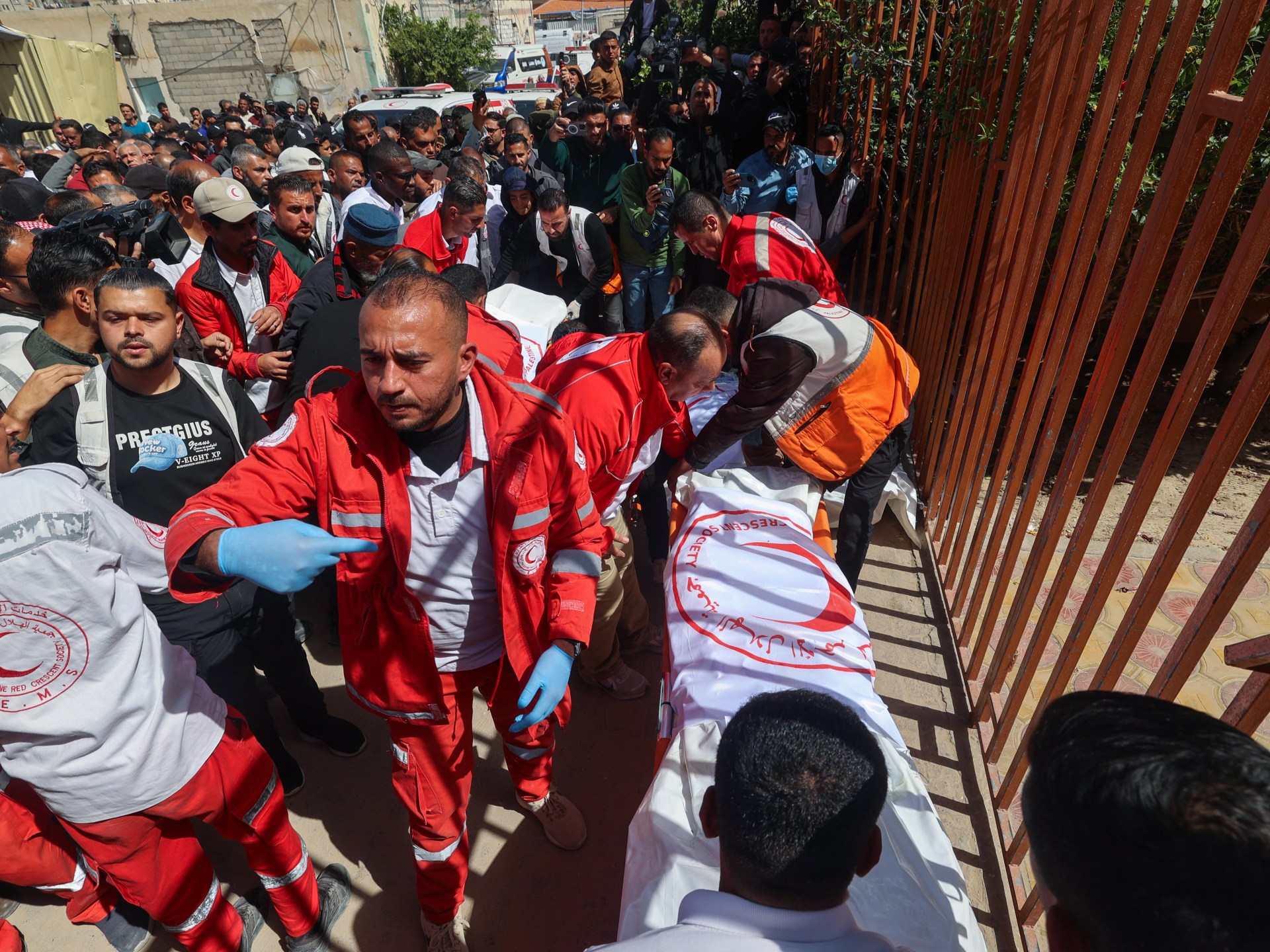
The Israeli military has released details of an investigation into its own killing of 15 Palestinian paramedics and aid workers in Gaza last month, saying its code of ethics was not violated and only one soldier is dismissed, in an attack that sparked outrage in the international community.
The Palestine Red Crescent Society (PRCS) and the Israeli rights organisation Breaking the Silence rejected the findings of the Israeli probe on Sunday.
PRCS’s president told Al-Araby TV that the Israeli narrative on the killings in Rafah was “contradictory”.
“It is incomprehensible why the occupation soldiers buried the bodies of the paramedics in a criminal manner,” Younis al-Khatib said.
Al-Khatib added that the Israeli army communicated with the paramedics before killing them and that the evidence – including a video showing their ambulances flashing emergency lights – proved “the falsity of the occupation’s narrative regarding the limited visibility at the site”.
“An independent and impartial investigation must be conducted by a UN body,” he said.
PRCS, which had medics killed by Israel in the incident, also denounced the Israeli report as “full of lies” on Sunday. “It is invalid and unacceptable, as it justifies the killing and shifts responsibility to a personal error in the field command when the truth is quite different,” Nebal Farsakh, spokesperson for the organisation, told the AFP news agency.
The PRCS said last week that it received confirmation from the International Committee of the Red Cross (ICRC) that one of its medics who was missing is being held by Israel.
🚨Urgent: We have been informed by the International Committee of the Red Cross that PRCS medic Assad Al-Nsasrah is being held by the Israeli occupation authorities. His fate had remained unknown since he was targeted along with other PRCS medics in #Rafah.
📢We call on the… pic.twitter.com/l0oOxujS8G— PRCS (@PalestineRCS) April 13, 2025
The Israeli army on Sunday claimed that six of the aid workers who were killed and buried in a shallow mass grave along with their ambulances were Hamas “terrorists”, without providing any evidence.
It admitted its probe detected a series of “professional failures”, including partial and inaccurate reporting by the commanding officers in the field invading southern Gaza’s Rafah.
The deputy commander of the Golani Reconnaissance Battalion will be dismissed, while the commanding officer of the 14th Brigade is to receive a reprimand.
The examination also found “no evidence to support claims of execution or that any of the deceased were bound before or after the shooting”, despite the testimonies and the evidence.
The Israeli military had initially claimed that the ambulances and aid workers were not clearly marked as first responders and approached its troops “suspiciously”.
A mobile phone video recorded by one of the killed aid workers that was obtained by the New York Times showed that the crew were clearly marked and visible to Israeli forces, and were killed by Israeli fire that lasted several minutes.
United Nations and Palestinian officials later found the mass grave and the bulldozed ambulances and bodies after Israeli authorities granted access to the area of the mostly destroyed city of Rafah bordering Egypt.
‘Another day, another cover-up’
The Israeli anti-occupation group Breaking the Silence said the military investigation is “riddled with contradictions, vague phrasing, and selective details”.
“Not every lie has a video to expose it, but this report doesn’t even attempt to engage with the truth,” the group said. “Another day, another cover-up. More innocent lives taken, with no accountability.”
But far-right voices in the government of Israeli Prime Minister Benjamin Netanyahu believe the army is going too far in punishing the soldiers.
Itamar Ben-Gvir, Israel’s ultranationalist national security minister, said the decision to dismiss the deputy commander was a “grave mistake” that must be reversed.
“Our combat soldiers, who are sacrificing their lives in Gaza, deserve our full support,” he said.

‘Report invites many questions’
Human rights lawyer Geoffrey Nice told Al Jazeera that the findings of the probe raise questions about the Israeli military’s conduct in Gaza and the thoroughness of the investigative process.
“It’s a pretty surprising document. It’s also a document that invites many questions that it will be difficult, I suspect, for the [Israeli military] to answer,” Nice said in a television interview.
“For example, [there is] the proposition that six of these people were Hamas, presumably members of Hamas on active [military] service, not people who might have been associated with Hamas in some way. No documentary evidence at all is identified [for that].”
Israel has a track record of denying accusations of wrongdoing and contradicting its own earlier statements.
Past investigations have exonerated the armed forces or placed the blame on a single individual without broader repercussions.
The UN accused the Israeli military of being responsible for the killing of the 15 aid workers, along with the killing of a Bulgarian UN staff member and wounding of six other foreign staff in Gaza’s Deir el-Balah last month.
The organisation has been forced to significantly cut its staff in Gaza as the war’s death toll continues to mount.
Middle East
Houthis say US bombs Yemen again, targeting capital Sanaa | Israel-Palestine conflict News
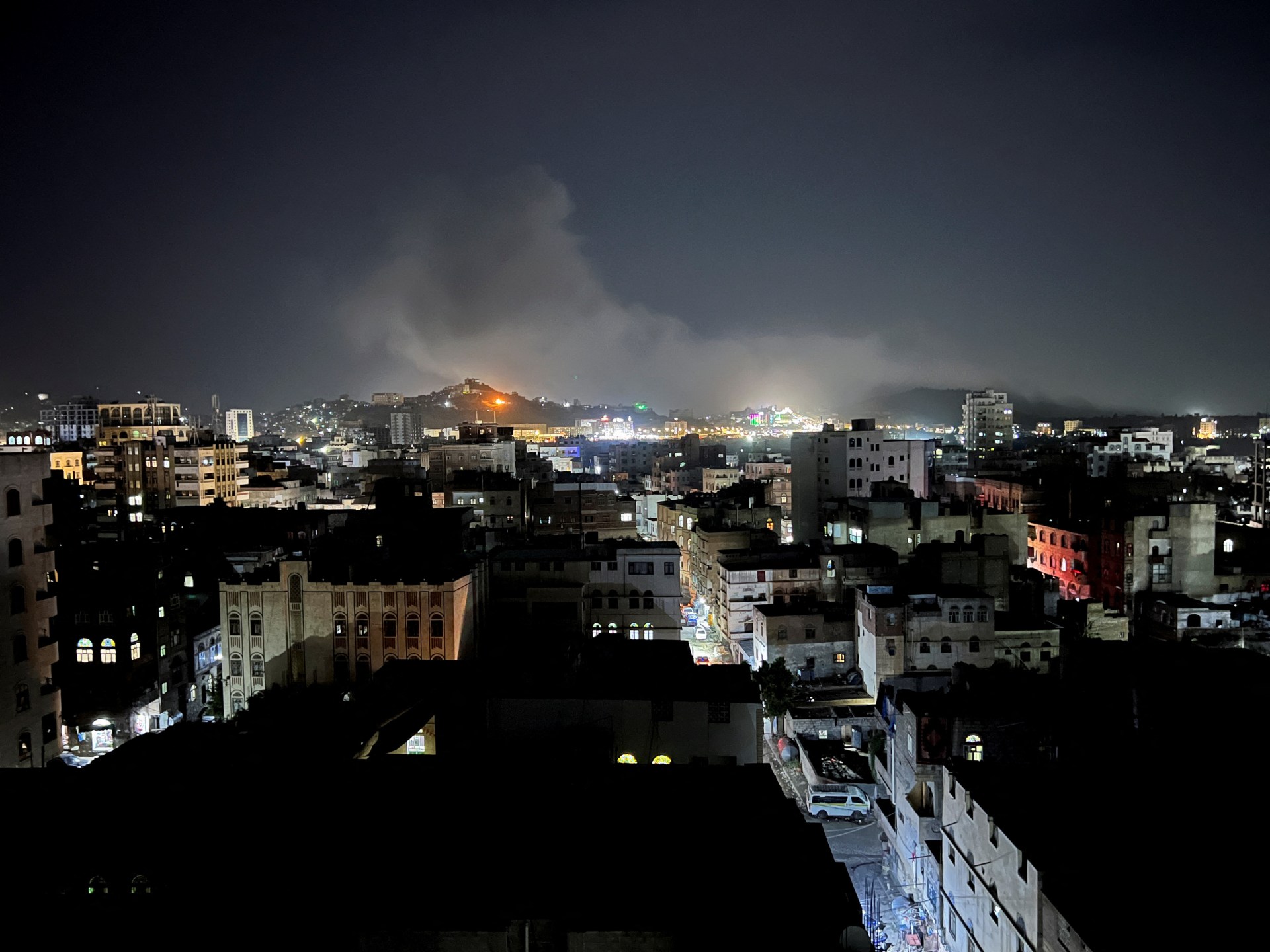
United States President Donald Trump’s administration announced a major military offensive against the Houthis a few weeks ago.
The United States has carried out more air strikes in Yemen’s capital Sanaa, after targeting Kamaran Island and Marib governorate earlier, Houthi media outlets report.
No details on casualties have been provided yet.
In Sanaa, two US airstrikes targeted the area of Attan, which has been controlled by the rebel movement since 2014. US airstrikes also reportedly targeted a sanitation project in the Asir area, as well as the Furwah neighbourhood and a popular market in the Shoub district, according to Houthi media.
The strikes on Sunday come a day after the US launched 13 strikes on Hodeidah’s port and airport, and three days after its deadliest attack to date targeted the Ras Isa port, also in Hodeidah, killing at least 80 people and wounding more than 150.
Houthi-held areas in Yemen have been subjected to near-daily air strikes by Washington. Civilians have been targeted, families wiped out, military sites destroyed and soldiers killed.
More than 200 people have been killed since US President Donald Trump’s administration announced a major military offensive against the Houthis in March. It said the air strikes are aimed at forcing the group to stop threatening ships sailing on the Red Sea on a route crucial to international trade.
Since November 2023, the Houthis have reportedly launched more than 100 attacks on vessels they say are linked to Israel in response to Israel’s war on Gaza and in solidarity with Palestinians.
Houthi attacks have paralysed shipping through the Suez Canal, a vital waterway through which approximately 12 percent of global shipping traffic normally passes, forcing many companies to resort to costly alternative routes around the Cape of Good Hope in South Africa.
The Houthis halted attacks on shipping lanes during a two-month ceasefire in Gaza earlier this year. But they vowed to resume strikes after Israel renewed its assault on the besieged enclave last month.
The Houthis, also known as Ansar Allah or “supporters of God”, emerged in the 1990s but rose to prominence in 2014 when they seized Sanaa and forced President Abd-Rabbu Mansour Hadi to flee the country.
-
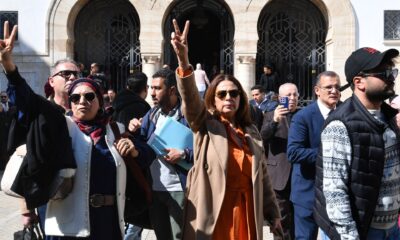
 Middle East2 days ago
Middle East2 days agoTunisian court hands opposition figures lengthy jail terms | Human Rights News
-
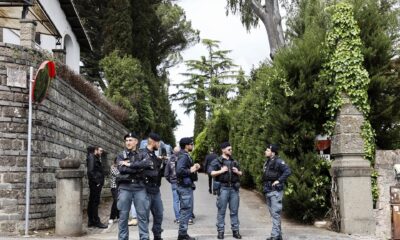
 Middle East2 days ago
Middle East2 days agoIran says progress in nuclear talks with US, confirms third round next week | News
-
Conflict Zones2 days ago
Could an earthquake shift the balance in Myanmar’s civil war? | Military News
-

 Sports2 days ago
Sports2 days agoRory McIlroy could go onto win 10 majors now Masters ‘shackles are off,’ says men’s captain of his hometown golf club
-
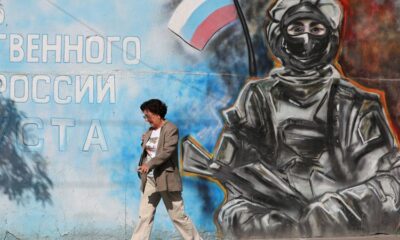
 Europe2 days ago
Europe2 days agoTrump administration ready to recognize Russian control of Crimea as part of framework to end Ukraine war, source says
-
Middle East2 days ago
Israeli bombardment of Gaza kills 92 in two days: Health Ministry | Israel-Palestine conflict News
-
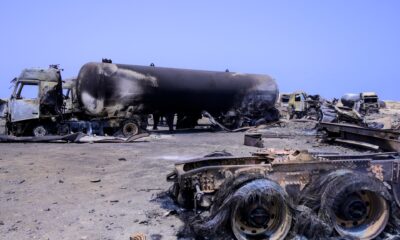
 Middle East1 day ago
Middle East1 day agoUS attacks Yemen again after at least 80 people killed in Hodeidah | Israel-Palestine conflict News
-
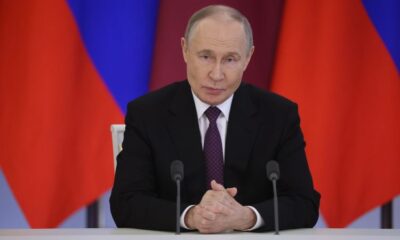
 Europe2 days ago
Europe2 days agoPutin declares brief ‘Easter truce’ in war, but Ukraine says it is still under attack



